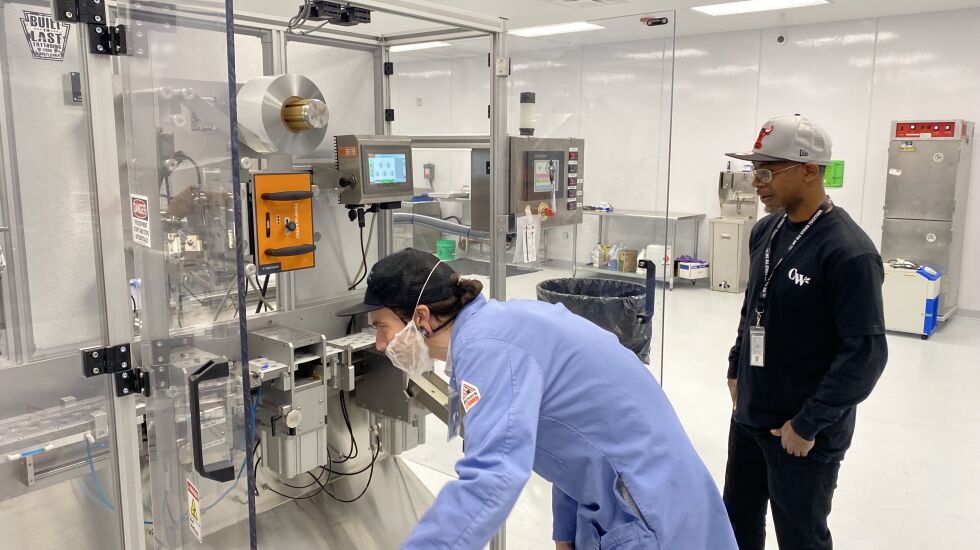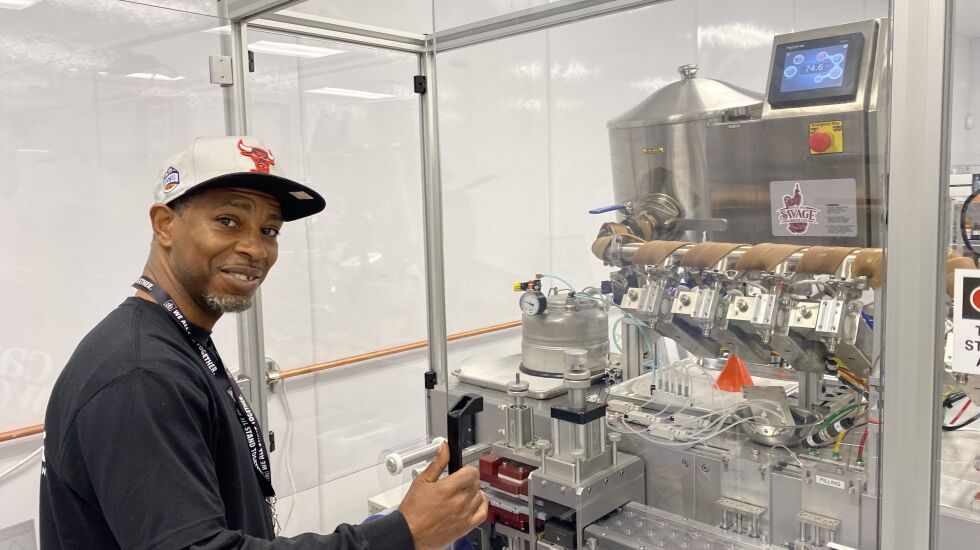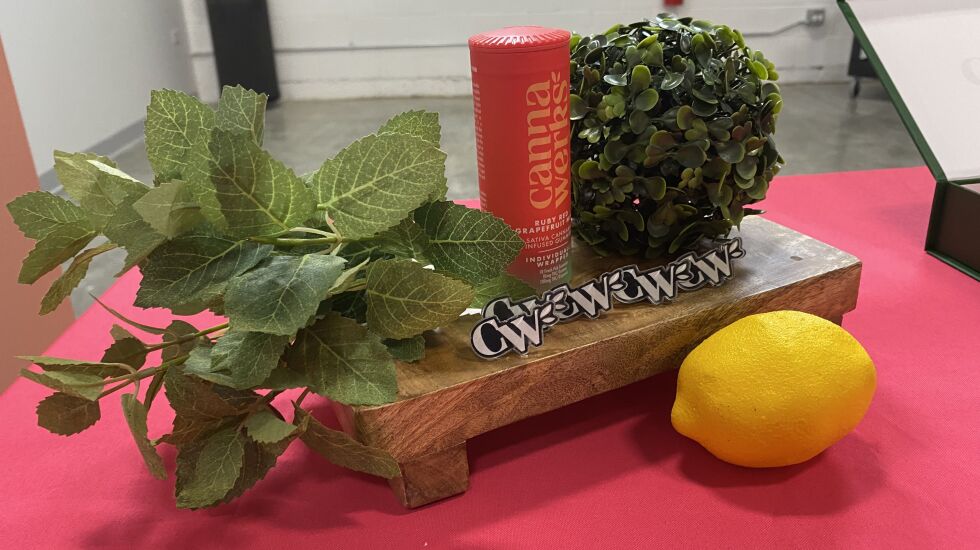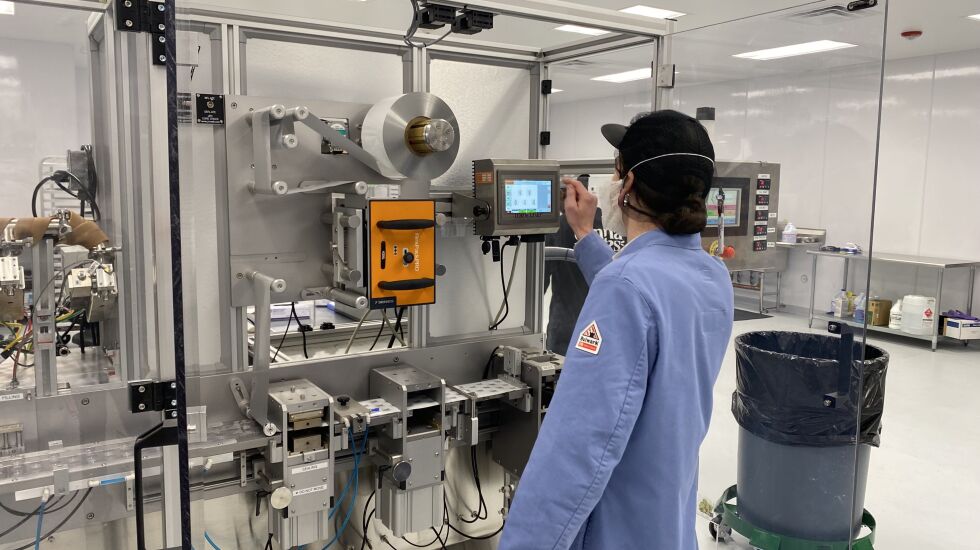
Nowadays, Kydric Estes gets paid an honest wage to produce the same kind of products that once got him picked up by police.
The South Chicago resident makes cannabis-infused gummies for Baked Buds, the first operational cannabis infuser in Chicago to qualify for a state social equity license.
Each individually wrapped gummy Estes makes has a 10-gram dose — stronger than the stuff he used to carry around illegally.
“It’s surreal,” said Estes, 42. “I’m dealing with stuff I would’ve gone to jail for.”
He knows what he’s talking about. About 20 years ago, Estes said, he was stopped by police for carrying 7 grams of weed.
He was kept in a cell for eight hours and accused of being a drug dealer before being let go.

But recreational marijuana is now legal in Illinois, and the state is trying to make up for its past crackdown on weed. One way is through the “social equity license” for pot-related businesses.
When Baked Buds sought one of those licenses in 2020, applicants had to fall into one of three categories:
• They had a cannabis offense expunged.
• They lived in an area with a disproportionately high rate of people incarcerated for marijuana-related offenses.
• Or, at least 51% of their employees fell into one of those two categories.
Baked Buds chose Door No. 3. About 10 of its employees either had a cannabis offense expunged or come from a disproportionately impacted area.
It got its license in 2021. But it took a while to find a space, pass city inspections and develop recipes. It began rolling out its first products — those gummies, called CannaWerks — in February.
The company celebrated its long-awaited grand opening Friday with a ribbon-cutting ceremony at its Near West Side facility. It was attended by employees, other cannabis company owners and public officials, including 27th Ward Ald. Walter Burnett.
Those gummies already are available in 26 stores, said co-founder Lance Gilbert. A list is on the company website.

The gummies come in three flavors, designed by Tim Coonan of Big Shoulders Coffee. The former chef is a friend of Gilbert and another co-founder.
Each flavor has a different effect: Ruby Red Grapefruit Mint for energy, Mango Thai Basil for relaxation, or Red Raspberry Yuzu, a combination of the first two, “for a gentle lift.”
Gilbert said they individually wrap the gummies because it’s more sanitary than a bag full of gummies and more practical to carry around.
Victoria Williams, owner of a cannabis transportation company contracted by Baked Buds and manager of sales for the infusing company, was among those present Friday.
The company’s opening was a long time coming, she said. The idea of social equity applications was supposed to even the playing field for entrepreneurs coming from disadvantaged backgrounds, but instead, she said the state’s program has been a “complete failure.”

She pointed to instances where the state failed to verify the equity requirements or deliver loans promised to social equity licensees.
“These departments are not moving with a sense of urgency to support the program — and therefore, social equity applicants are struggling,” Williams said.
That’s why she made sure to make it to the ribbon-cutting Friday and was the one wielding the scissors.
Off to the side, Estes watched company leaders and the local alderperson cut the ribbon and reflected on the changed world that younger Illinoisans will come up in today.
“They’ll never have to go through what we went went through to enjoy the health benefits or pleasures of cannabis,” he said. “They won’t have to look over their shoulder or sit in a cold cell.”
Michael Loria is a staff reporter at the Chicago Sun-Times via Report for America, a not-for-profit journalism program that aims to bolster the paper’s coverage of communities on the South Side and West Side.
On the weed (beat) and watching how it's made for @Suntimes today. Checking out the production facility of the city's first operational cannabis diffuser to get a state social equity license. Given they applied in 2020, some say it's about time they were able to open. Story tk pic.twitter.com/0FH8TNrHfD
— Michael Loria (@mchael_mchael) April 28, 2023







